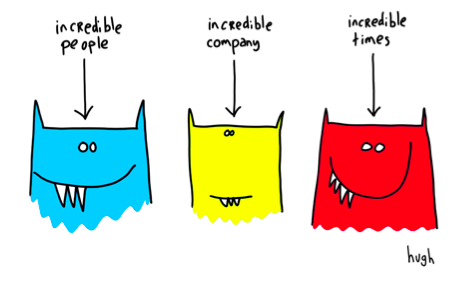Business owners are waking up to the fact that skills aren’t everything; that hiring someone who perhaps lacks the experience of other candidate, but fits very well with the company’s culture, is very often the smarter decision. Remember, skills can be thought and experience gained, but a person’s core values and beliefs are practically impossible to change.
So why should you bother hiring based on cultural fit? Research has shown that employees who fit well with their organisation and colleagues tend to demonstrate superior job performance, express greater job satisfaction and stay with their employer’s longer. That means less time spent recruiting and training staff and more time making money for your business.
What is Cultural Fit?
Before we continue any further I think it’s important that I clarify just what I mean by cultural fit. In recent months, I’ve encountered a number of HR managers and business owners worried about focusing on cultural fit in the hiring process for fear that it might inadvertently lead to discrimination against candidates, promote group think and hamper diversity.
Let’s be clear, hiring for cultural fit does not mean seeking out clones or people you could see yourself sharing a couple of pints with on a Friday after work. The best recruiters and employers recognise that even when a candidate’s personality and interests differ from their own, they can still be a strong fit for the business.
Cultural fit is the likelihood that a candidate will mirror and adapt to the core beliefs, attitudes and collective behaviours of an organisation.
For example, someone who places a lot of emphasis on team work and working through problems together, will thrive if your business places a lot of emphasis on collaboration. While someone who prefers to work by themselves will struggle to adjust to the way your company operates.
Here are some simple measures you can take to help identify if a candidate is a good cultural fit for their organisation:
#1. Identify Your Company’s Culture
If you haven’t already done so, the first step you need to take is to identify your organisation’s own culture. Every organisation, whether it has just one employee or 5,000 staff, has a culture. Your culture is the set of beliefs and values that drive you and your employees to do what you do.
What three or four words/ expressions sum up your beliefs and values? Perhaps you’re client centric and putting the customer first is the basis for everything you do. Or maybe innovation is your top priority and you place creativity and innovation above all else.
Your mission statement and company vision can help define what it is you stand for but it’s also worth asking staff and getting their input to ensure everyone is on the same page. Aligning your culture with your values deserves its own blog entirely.
#2. Use Personality Tests
Personality tests go beyond traditional IQ tests to give employers an insight into a candidate’s emotional qualities, and how they adapt to and behave in certain situation. There are many personality tests for companies to choose from, such as the Myers-Briggs Type Indicator or the Hogan Assessment, all of which use very different and in depth approaches to assess a candidate’s personality.
Personality tests typically measure five personality dimensions in an applicant: extroversion, emotional stability, agreeableness, conscientiousness, and openness to experience. So if you’re looking for an outgoing leader, with an ability to make balanced decisions under pressure, then you might want to take a closer look at your candidates’ personality test results.
I previously wrote a blog on the Advantages and Disadvantages of Employee Personality Tests, which provides a lot more information on the topic.
#3. Mix Up Your Questioning
We all know interviewees prepare for interviews by rehearsing answers to the questions they know we’ll ask. Quite often these are geared to what they think the interviewer will want to hear, sapping all sense of authenticity and personality from the response.
Think outside the box when it comes to the questions you ask. Taking candidates off the expected script will help glean information about them that they otherwise might not have shared, allowing you to better understand their core values and beliefs and how they match up to your organisation’s.
Among my favourite culture focused questions to ask in an interview are:
- What was your first job and what did you learn from the experience?
- If this were your company, give me three words to describe the kind of culture it would have?
- Tell me about the best manager/ supervisor you ever had. What did you like most about them? What did you dislike?
#4. Involve Your Employees
Whether you’re the owner, CEO, HR manager or recruiter, it’s unlikely that your new employee is going to be working directly with you as much as they will with other members of your staff. For this reason, it’s especially important that the candidate gets along with their future colleagues.
A tour around the office will give the candidate a chance to see first-hand how your business works and the dynamic of the business. More importantly, it will allow you to see how they interact with your employees.
For more helpful HR tips and advice, CLICK HERE to sign up to our monthly newsletter.




 RSS Feed
RSS Feed